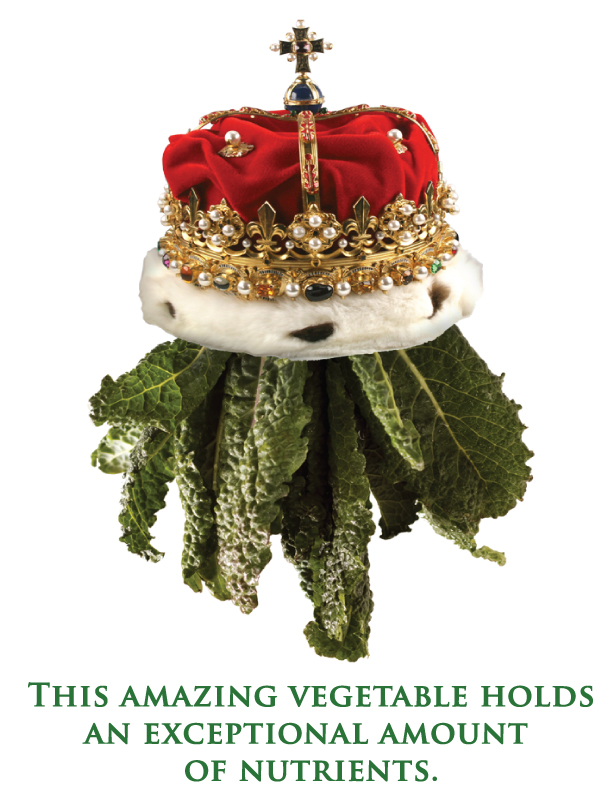by Sharon Quercioli
Move over Popeye and your spinach because kale is the new lean, green, health promoting machine! The popularity of kale is growing exponentially, and it’s no wonder. This amazing vegetable holds an exceptional amount of nutrients. With all the health benefits and delicious flavor, it’s become one of my new favorite veggies, and I have incorporated it into my diet at least three times per week.
Eating a variety of natural, unprocessed vegetables can do wonders for your health, but choosing super-nutritious kale on a regular basis may provide significant health benefits, including cancer protection and lowered cholesterol.
There are few vegetables on the planet that are as healthy as kale. The beautiful leafy green kale comes in a variety of appearances, including curly, ornamental or dinosaur varieties. It belongs to the Brassica family that includes cruciferous vegetables such as cabbage, collards, broccoli and Brussels sprouts.
What makes kale a vegetable health marvel? Here is why it’s a champion among natural foods—and ways to work it into your diet.
Kale is a Nutritional Powerhouse
One cup of kale contains 36 calories, 5 grams of fiber and 15% of the daily requirement of calcium and vitamin B6 (pyridoxine), 40% of magnesium, 180% of vitamin A, 200% of vitamin C and 1,020% of vitamin K. It is also a good source of minerals (copper, potassium, iron, manganese and phosphorus).
Kale’s health benefits are primarily linked to the high concentration and excellent source of antioxidant vitamins (A, C and K) and sulphur-containing phytonutrients.
Carotenoids and flavonoids are the specific types of antioxidants associated with many of the anti-cancer health benefits. Kale is also rich in the eye-health promoting lutein and zeaxanthin compounds.
Beyond antioxidants, the fiber content of cruciferous kale binds bile acids, helps lower blood cholesterol levels and reduces the risk of heart disease, especially when kale is cooked instead of raw.
Super-Rich in Vitamin K
According to the American Journal of Clinical Nutrition, the potent antioxidant vitamin K can reduce the risk of developing or dying from cancer. Kale (as well as parsley, spinach and collard greens) is packed with the powerhouse vitamin K.
Vitamin K is required for a wide variety of bodily functions, including normal blood clotting, antioxidant activity and bone health.
Although vitamin K is a wonder antioxidant, too much can pose problems for some people. Anyone taking anticoagulants such as warfarin should avoid kale because the high level of vitamin K may interfere with the drugs. Consult your doctor before adding kale to your diet.
Kale might be a source of power nutrients, but is also contains oxalates, which are naturally occurring substances that can interfere with the absorption of calcium. It’s a good idea to avoid eating calcium-rich foods like dairy at the same time as kale to prevent any problems.
Easy Ways to Prepare Kale
Quick cooking preserves kale’s nutrients, texture, color and flavor. Rinse kale, chop it finely and add it to soups, stews, stir-frys, salads, egg dishes or casseroles. (If you want to cheat a little, you can top a pizza with kale for added nutritional goodness.) Steam kale for five minutes to make it more tender or eat it raw. You can also substitute it for spinach or collard greens in recipes.
Other fast and easy ways to prepare kale:
- Make a simple salad with a bunch of thinly sliced kale, red pepper, onion, raisins and your favorite salad dressing.
- Braise chopped kale and apples, garnish with chopped walnuts and add a splash of balsamic vinegar.
- Toss whole-grain pasta with chopped kale, pine nuts, feta cheese and a little olive oil.
- Cover and cook a pound of chopped kale with a few garlic cloves and 2 tablespoons olive oil for 5 minutes; season with salt, pepper and a tablespoon of red wine vinegar.
- Make kale chips by slicing kale into bite-size pieces, toss with a drizzle of olive oil and a pinch of salt, and bake for 10-15 minutes at 350 degrees in the oven.
The foundation of a healthy diet includes vegetables which are rich in nutrients and fiber, fat-free and low in calories. Adding kale into the mix can enhance the nutritional goodness of your diet and help you eat the recommended 4-5 servings of vegetables every day.
Now you see why Kale is King!


Pingback: Let’s Talk About Foods that Build Muscle | Our Wonderful World Media